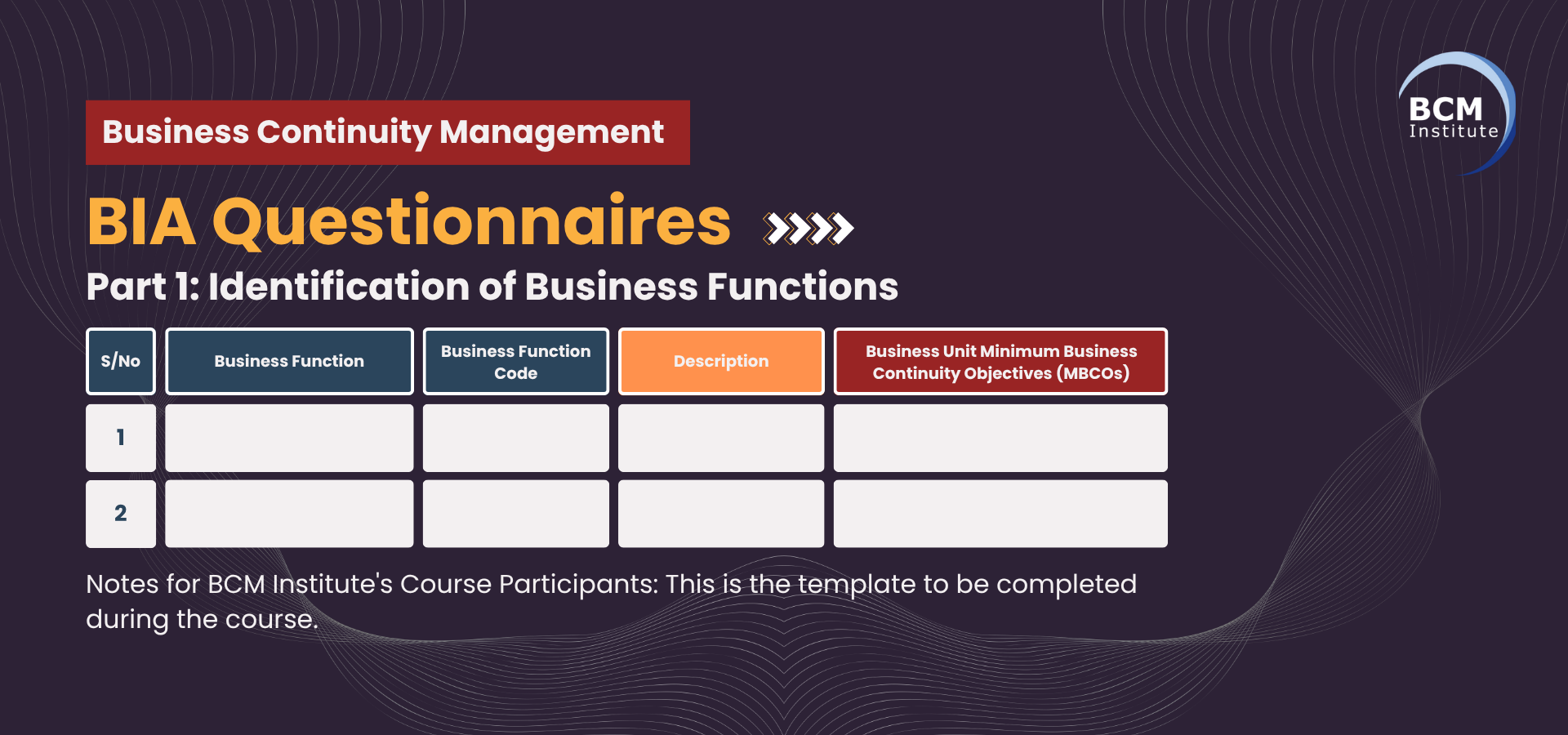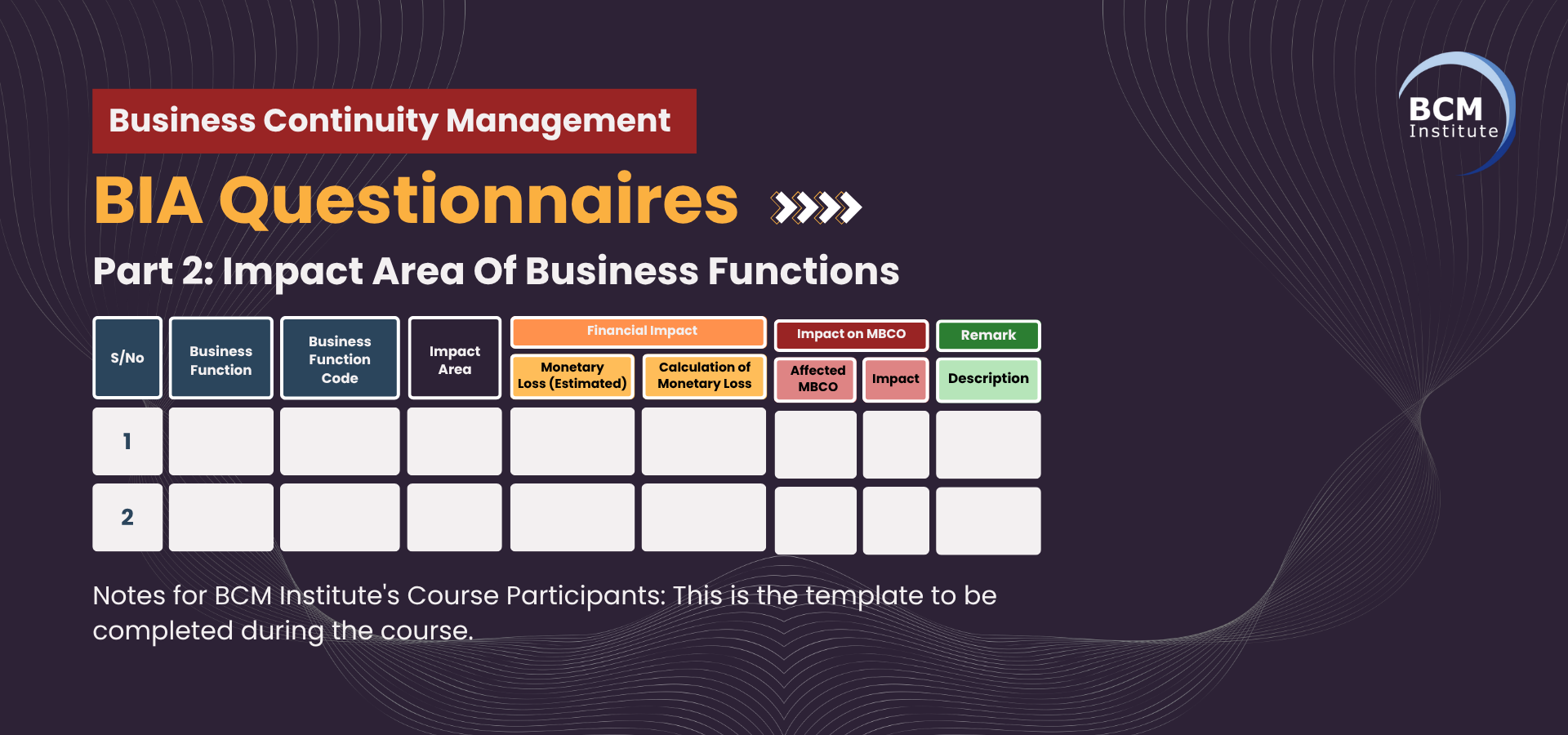Identification of Business Functions for CBF-1 Special Education Services (Pathlight School)
In the context of Business Continuity Management (BCM), identifying critical business functions is a foundational step in safeguarding the resilience of essential services.
For the Autism Resource Centre (ARC), Special Education Services delivered through Pathlight School form the core of its mission to empower individuals with autism through structured and inclusive education.
This chapter focuses on the breakdown and understanding of the critical business function labelled CBF-1: Special Education Services (Pathlight School).
The purpose of this section is to provide a detailed overview of the key subfunctions that support the delivery of special education services. Each sub-function is assessed based on its operational significance, continuity requirements, and contribution to the overall service objective.
By documenting these processes along with their corresponding Business Unit Minimum Business Continuity Objective (BU MBCO), ARC establishes a clear baseline for prioritising recovery efforts during disruptions.
This structured identification enables proactive risk management, resource allocation, and targeted recovery planning to ensure uninterrupted support to its students and stakeholders.
Table: Sub-Critical Business Function and MBCO for CBF-1 Special Education Services (Pathlight School)
|
Sub-CBF Code |
Sub-Critical Business Function |
Description of CBF |
Business Unit Minimum Business Continuity Objective (MBCO) |
|
CBF-1.1 |
Curriculum Development and Academic Planning |
Designing, updating, and aligning educational curricula and academic schedules tailored for students with autism spectrum disorder (ASD). |
Ensure critical curriculum materials are available within five business days to enable the resumption of core teaching activities. |
|
CBF-1.2 |
Classroom and Learning Delivery (Onsite & Remote) |
Execution of daily teaching and learning, whether physically or digitally, to maintain education delivery continuity for students. |
Restore at least 50% of classroom and remote learning activities within one business day, with full resumption within three business days. |
|
CBF-1.3 |
Student Support Services (Allied Professionals) |
Provision of occupational therapy, speech therapy, counselling, and psychological assessments to support student development. |
Resume priority support services for high-needs students within two business days; full operations within five business days. |
|
CBF-1.4 |
Behavioural and Emotional Support |
Managing and implementing behavioural intervention plans and emotional regulation strategies tailored to each student’s needs. |
Resume support for students with critical behavioural needs within one business day; complete restoration within three business days. |
|
CBF-1.5 |
Individual Education Plan (IEP) Management |
Creation, monitoring, and review of personalised education goals and development milestones for each student. |
Ensure IEPs are accessible and updates are resumed within three business days to support continuity in learning outcomes. |
|
CBF-1.6 |
Student Transport Coordination |
Scheduling and managing daily transport for students to and from the school campus, ensuring safety and punctuality. |
Restore transportation logistics for essential student groups within one business day; full service within three business days. |
|
CBF-1.7 |
Parent and Caregiver Communication |
Dissemination of timely updates, announcements, and progress reports to parents and caregivers regarding school activities and student performance. |
Restore core communication channels (e.g., email, hotline, school apps) within one business day. |
|
CBF-1.8 |
Examination and Assessment Administration |
Management and facilitation of internal and external assessments, including national exams and performance evaluations. |
Resume critical assessments and examination planning activities within three business days to maintain academic integrity. |
|
CBF-1.9 |
Vocational and Life Skills Training |
Delivery of practical vocational and independent living skills to prepare students for post-school life and community inclusion. |
Resume essential vocational and life skills training modules within three business days; prioritise higher-need learners. |
|
CBF-1.10 |
Emergency and Safety Protocols in Schools |
Implementation of safety drills, emergency evacuation plans, and crisis response procedures specific to the special needs school environment. |
Reinstate all essential safety and emergency protocols immediately or within one business day after disruption. |
Summing Up ... for Part 1
The identification of Sub-CBFs under CBF-1 – Special Education Services (Pathlight School) offers a comprehensive view of the core operations that must be preserved to ensure the continuity of ARC’s most vital educational services.
Each sub-process—from classroom delivery and curriculum planning to behavioural support and emergency protocols—plays a critical role in the seamless operation of Pathlight School.
By assigning a specific BU MBCO to each sub-function, ARC not only quantifies its operational tolerance for downtime but also reinforces its commitment to safeguarding the learning journey and well-being of its students.
This foundational mapping will inform subsequent business continuity strategies, including risk assessments, recovery planning, and continuity testing.
Ultimately, this ensures that ARC remains well-prepared to uphold its educational mission even in the face of unexpected disruptions.
CBF-1: Special Education Services (Pathlight School) – Autism Resource Centre
This chapter presents a structured analysis of the impact areas associated with the critical business function CBF-1: Special Education Services (Pathlight School) operated by the Autism Resource Centre (ARC).
As Singapore’s first autism-focused school offering a mainstream academic curriculum combined with life readiness skills, Pathlight plays a vital role in serving the needs of students on the autism spectrum.
Each sub-function under CBF-1 contributes to a complex yet coordinated service ecosystem that ensures students receive a well-rounded, supportive, and safe educational experience.
The objective of this analysis is to evaluate the potential impact of disruptions across key sub-functions by identifying their specific impact areas, estimating financial losses, and assessing their effect on the Minimum Business Continuity Objective (MBCO).
This chapter also highlights the strategic, reputational, legal, and operational risks that may arise from such disruptions.
Understanding these dimensions is critical to prioritising mitigation and recovery efforts, ensuring that Pathlight School remains resilient and continues to uphold the quality of education and care expected by its stakeholders.
Table: Impact Assessment of CBF-1 Special Education Services (Pathlight School)
|
Sub-CBF Code |
Sub-CBF |
Impact Area |
Financial Impact – Monetary Loss (Estimated) |
Financial Impact – Calculation of Monetary Loss (State Formula for Calculations) |
Impact on MBCO – Affect MBCO |
Impact on MBCO – Impact |
Remarks – Description |
|
CBF-1.1 |
Curriculum Development and Academic Planning |
Reputational, Operational |
SGD 30,000/ .month |
(No. of Curriculum Staff × Avg Monthly Salary) + (Outsourced Development Fees) |
Yes |
Delays in curriculum readiness will affect all classroom teaching and student learning |
Delays can cascade across school terms and reduce educational effectiveness. |
|
CBF-1.2 |
Classroom and Learning Delivery (Onsite & Remote) |
Operational, Legal |
SGD 200,000/ month |
(No. of Teachers × Avg Salary) + (Facility Cost × Downtime) + (Technology Cost for Remote Learning Failures) |
Yes |
Core function of the school; any disruption halts learning for all students |
Impacts daily instruction, student progress and parental trust. |
|
CBF-1.3 |
Student Support Services (Allied Professionals) |
Health & Safety, Reputational |
SGD 80,000/ month |
(No. of Allied Staff × Avg Salary) + Missed Therapy Sessions × Avg Session Rate |
Yes |
Affects development plans and intervention services critical for special needs students |
Potential regression in student development. |
|
CBF-1.4 |
Behavioural and Emotional Support |
Health & Safety, Reputational |
SGD 60,000/ month |
(No. of Counsellors × Avg Salary) + Cost of Managing Student Incidents |
Yes |
Unmanaged behavioural issues may cause disruption and endanger others |
Essential for a safe and conducive learning environment. |
|
CBF-1.5 |
Individual Education Plan (IEP) Management |
Compliance, Reputational |
SGD 25,000/ month |
(IEP Coordinators × Avg Salary) + Penalties for Non-Compliance (if any) |
Yes |
Legal and reputational impact from not meeting IEP obligations |
Affects student rights and institutional accountability. |
|
CBF-1.6 |
Student Transport Coordination |
Operational, Health & Safety |
SGD 40,000/ month |
(No. of Routes × Cost per Route) + (Penalty from Transport Provider) |
Yes |
Disruption in transport causes missed classes and safety concerns |
Crucial for attendance and punctuality of students with mobility needs. |
|
CBF-1.7 |
Parent and Caregiver Communication |
Reputational |
SGD 15,000/ month |
(Comms Team Cost × % Allocation to Crisis Comms) + (PR Crisis Management Cost if any) |
Yes |
Poor communication damages trust and increases complaints |
Affects stakeholder perception and escalation risk. |
|
CBF-1.8 |
Examination and Assessment Administration |
Compliance, Reputational |
SGD 20,000/ month |
(Exam Team Cost + Invigilation × Days) + Rescheduling Penalties |
Yes |
Failure to deliver exams affects progression and certification |
Time-sensitive and high-stakes for students. |
|
CBF-1.9 |
Vocational and Life Skills Training |
Operational, Strategic |
SGD 50,000/ month |
(Trainer Costs + Equipment Cost per Module) + Lost Partner Subsidies (if any) |
Yes |
Reduces student preparedness for post-school employment or independence |
Key to ARC’s long-term mission of student empowerment. |
|
CBF-1.10 |
Emergency and Safety Protocols in Schools |
Health & Safety, Legal |
SGD 100,000/ event |
(Cost of Incident Management + Emergency Response Cost + Legal Penalties if any) |
Yes |
Direct impact on student safety, legal exposure, and organisational reputation |
Failure may result in injury, liability, or school closure. |
Notes
- MBCO: Minimum Business Continuity Objective.
- The financial figures are illustrative estimates and would be calibrated based on actual staffing, scale, and contractual obligations.
- Impact Areas follow the standard categories from BCMpedia: Financial, Operational, Reputational, Legal/Regulatory, Strategic, Health & Safety.
Summing Up … for Part 2
The assessment of CBF-1: Special Education Services at Pathlight School reveals that any disruption to its sub-functions would result in significant operational and reputational consequences for the Autism Resource Centre.
Key services such as classroom delivery, student support, behavioural guidance, and safety protocols are directly linked to the core mission of the organisation and its compliance with regulatory obligations.
Financial implications, while measurable, are often overshadowed by the long-term developmental and societal costs of disrupted services to students and families.
By mapping the impact areas and evaluating each sub-function’s influence on the MBCO, ARC can better prioritise resources, strengthen recovery capabilities, and ensure the continuity of essential education services.
This chapter lays the groundwork for informed business continuity planning. It emphasises the importance of a resilient operational framework that supports both the academic and emotional well-being of its students.
More Information About Business Continuity Management Courses
To learn more about the course and schedule, click the buttons below for the BCM-300 Business Continuity Management Implementer [BCM-3] and the BCM-5000 Business Continuity Management Expert Implementer [BCM-5].





![[BCM] [ARC] [E3] [BIA] [T1] [CBF] [1] Special Education Services (Pathlight School)](https://no-cache.hubspot.com/cta/default/3893111/aaf14bb8-5296-4aa3-93ff-873e21e02ee8.png)

![[BCM] [ARC] [E3] [BIA] MBCO Corporate MBCO](https://no-cache.hubspot.com/cta/default/3893111/8b5a4659-4e08-4a32-bb71-5e05d8066116.png)
![[BCM] [ARC] [E3] [BIA] [PS] Key Product and Services](https://no-cache.hubspot.com/cta/default/3893111/3819e06a-e6d1-43e3-a7d4-8a8b82f14ce6.png)
![[BCM] [ARC] [E3] [RAR] [T1] List of Threats](https://no-cache.hubspot.com/cta/default/3893111/58a62e36-907a-4b20-9047-b0ef2c9b2e58.png)
![[BCM] [ARC] [E3] [RAR] [T2] Treatment and Control](https://no-cache.hubspot.com/cta/default/3893111/51246baa-83ee-4d90-9148-919db2c8730f.png)
![[BCM] [ARC] [E3] [RAR] [T3] Risk Impact and Likelihood Assessment](https://no-cache.hubspot.com/cta/default/3893111/8a301e1f-2cd0-4a35-b2bd-8204cf830135.png)
![[BCM] [ARC] [E3] [BCS] [T1] Mitigation Strategies and Justification](https://no-cache.hubspot.com/cta/default/3893111/efa97435-05c3-4502-8b67-a9a40e07e1cb.png)
![[BCM] [ARC] [E1] [C10] Identifying Critical Business Functions](https://no-cache.hubspot.com/cta/default/3893111/c9f7f8e4-66d9-415e-b2ed-cf55f548e743.png)
![[BCM] [ARC] [E3] [BIA] [DP] [CBF] [1] Special Education Services (Pathlight School)](https://no-cache.hubspot.com/cta/default/3893111/3a7223d8-d6af-4d8e-918a-bbada1718a87.png)
![[BCM] [ARC] [E3] [BIA] [T2] [CBF] [1] Special Education Services (Pathlight School)](https://no-cache.hubspot.com/cta/default/3893111/32fa5029-a3b8-405f-bb3a-980afb1e5e59.png)
![[BCM] [ARC] [E3] [BIA] [T3] [CBF] [1] Special Education Services (Pathlight School)](https://no-cache.hubspot.com/cta/default/3893111/e0b729b6-e665-482f-9d26-ce2f1e6ec4c0.png)
![[BCM] [ARC] [E3] [BCS] [T1] [CBF] [1] Recovery Strategies](https://no-cache.hubspot.com/cta/default/3893111/fc111ebc-cd16-40c7-9ec8-7caf8e7eb7e3.png)
![[BCM] [ARC] [E3] [BCS] [T3] [CBF] [1] Minimum Resources Required during a Disaster](https://no-cache.hubspot.com/cta/default/3893111/ecb09d53-ccd9-4f57-9bef-56228f2a9aff.png)
![[BCM] [ARC] [E3] [PD] [CBF] [1] Special Education Services (Pathlight School)](https://no-cache.hubspot.com/cta/default/3893111/f618f315-8c77-487c-98ab-c59623592e74.png)


![Register [BL-B-3]*](https://no-cache.hubspot.com/cta/default/3893111/ac6cf073-4cdd-4541-91ed-889f731d5076.png)



![FAQ [BL-B-3]](https://blog.bcm-institute.org/hs-fs/hubfs/hub_generated/resized/9b7f5669-8ad6-450b-a98f-5f5d49ebfc8e.png?width=150&height=150&name=9b7f5669-8ad6-450b-a98f-5f5d49ebfc8e.png)
![Email to Sales Team [BCM Institute]](https://no-cache.hubspot.com/cta/default/3893111/3c53daeb-2836-4843-b0e0-645baee2ab9e.png)





